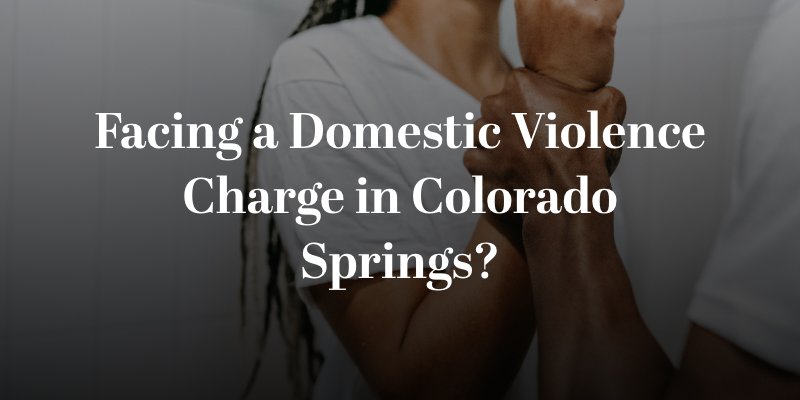Colorado Springs Domestic Violence Attorney
Domestic violence charges are serious, even at the misdemeanor level. In fact, arrests for domestic violence can damage personal relationships, reputations, and careers. These cases can also threaten your freedom and future.
We understand the impacts of domestic abuse charges and convictions. This is why we are dedicated to providing effective defense advocacy to those accused of domestic violence charges.
If you were arrested for domestic abuse, you can turn to our Colorado Springs criminal defense attorneys. We provide support and superior representation and will help you navigate the criminal justice system.
When you partner with us, you can be confident that your rights will be fully protected. We will work to limit the negative impacts and achieve the best outcome possible.
We are available 24/7 to answer your questions, assuage your concerns, and defend you. We can meet you and/or a loved one at jail or our Colorado Springs office. We can also discuss your case over the phone.
Let Our Colorado Springs Domestic Violence Lawyer Help
 With more than 30 years of criminal trial experience, our Colorado Springs domestic violence lawyer, Eric Anaya, is a former prosecutor. We have a deep understanding of how prosecutors build and present cases. This gives us the insights necessary to anticipate what the prosecution may do and strategically structure your defense.
With more than 30 years of criminal trial experience, our Colorado Springs domestic violence lawyer, Eric Anaya, is a former prosecutor. We have a deep understanding of how prosecutors build and present cases. This gives us the insights necessary to anticipate what the prosecution may do and strategically structure your defense.
When you are facing criminal charges, you want people in your corner who will fight for you. During a free case consultation with our attorney, we can help you understand your legal options and determine how we can help with your case.
Case Results
Here are just a few of our successful domestic violence case results:
Case Dismissed
Domestic Violence Harassment – Dismissed after negotiations with District Attorney
Case Dismissed
2 Misdemeanor Domestic Violence Cases – Both cases dismissed and sealed before trial
Case Dismissed
Class 1 Misdemeanor Domestic Violence 3rd Degree Assault – Dismissal and case sealed
“Eric provided us with excellent guidance and representation.”
-S. O.
Quick Links
- How Does Colorado Law Define Domestic Violence?
- What Happens After Police Are Called?
- Common Domestic Violence Charges
- When Are Misdemeanor vs. Felony Domestic Violence Charges Filed?
- What Are the Penalties for a Domestic Violence Charge?
- Defense Strategies for Colorado Domestic Violence Charges
- Can a Domestic Violence Charge Lead to Loss of Custody or Visitation Rights?
- How Does Domestic Violence Affect Employment?
- Domestic Violence Charge FAQs
How Does Colorado Law Define Domestic Violence?
Colorado law (C.R.S. 18-6-800.3) defines domestic violence as “an act or threatened act of violence upon a person with whom the actor is or has been involved in an intimate relationship.” The law also defines:
- Domestic violence is any act against property, including an animal, that is used to coerce, punish, intimidate, or enact revenge upon a person with whom the actor is in an intimate relationship.
- An intimate relationship is any relationship between spouses, current or former unmarried couples, or unmarried parents of a child (regardless of whether they have ever lived together).
Here are some crucial aspects of domestic violence charges that are important to understand:
- Domestic Violence Is Not a Distinct Crime: It’s noteworthy that domestic violence (DV) isn’t considered a distinct crime in Colorado – you can’t be charged just with domestic violence. Rather, it serves as an aggravating factor that enhances penalties for crimes committed against former or current intimate partners.
- Protection Order Will Be Issued: If you’re arrested for domestic violence, one of the immediate repercussions is the issuance of a protection order. These serve to protect alleged victims, requiring you to stay away from them.
- Mandatory Arrest State: Colorado is considered a mandatory arrest state. This means that if police have probable cause that someone committed domestic violence, they must arrest them.
- Victim Cannot Drop Charges: Once a person is arrested for domestic violence, the prosecutor has the power to move forward with charges even if the victim recants and is unwilling to testify; they won’t drop the charges simply because the victim asks them to.
What Happens After Colorado Springs Police Are Called?
Their primary focus is to determine whether there is probable cause that a domestic violence offense has occurred. Probable cause means that there are reasonable grounds to suspect that something has taken place.
If there is probable cause of domestic violence, police are required to arrest the person suspected. The police must do this “without undue delay.” This is due to Colorado’s mandatory arrest laws in domestic violence cases.
Once an arrest has been made by law enforcement:
- A mandatory protection order will go into effect. This order prohibits the accused person from communicating with the alleged victim. The intention is to protect alleged victims as the investigation and case proceed. Violating the terms of a protective order can result in more criminal charges and cases.
- The victim cannot “drop” the charges. Whether or not the case will proceed is the prosecutor’s decision. Prosecutors may consider the alleged victim’s wishes when deciding whether to pursue the case.
Common Colorado Domestic Violence Charges
The domestic violence enhancement can be applied to any crime, even those that don’t directly harm a person, including those against property and pets. However, there are certain crimes in Colorado that are commonly enhanced by domestic violence charges, including the following:
Menacing (CRS 18-3-206): A person “…knowingly places or attempts to place another person in fear of imminent serious bodily injury..”
Stalking (CRS 18-3-602): Making “…a credible threat to another person and, in connection with the threat, repeatedly follows, approaches, contacts, or places under surveillance that person, a member of that person’s immediate family, or someone with whom that person has or has had a continuing relationship…”
Harassment (CRS 18-9-111): A person commits harassment if, with intent to harass, annoy, or alarm another person, he or she:
- Strikes, shoves, kicks, or otherwise touches a person or subjects him to physical contact; or
- In a public place directs obscene language or makes an obscene gesture to or at another person; or
- Follows a person in or about a public place…”
Assault (CRS 18-3-202 –204): When someone “…knowingly or recklessly causes bodily injury to another person or with criminal negligence the person causes bodily injury to another person by means of a deadly weapon…”. This includes strangulation charges.
Sexual Assault (CRS 18-3-402): “Any actor who knowingly inflicts sexual intrusion or sexual penetration on a victim commits sexual assault if:
- The actor causes submission of the victim by means of sufficient consequence reasonably calculated to cause submission against the victim’s will…”
Sexual Contact (CRS 18-3-404): “Any actor who knowingly subjects a victim to any sexual contact commits unlawful sexual contact if:
- The actor knows that the victim does not consent…”
Child Abuse (CRS 18-6-401): “Cause an injury to a child’s life or health, or permits a child to be unreasonably placed in a situation that poses a threat of injury to the child’s life or health…”
False Imprisonment (CRS 18-3-303): “Any person who knowingly confines or detains another without the other’s consent and without proper legal authority commits false imprisonment.”
Violating a Restraining Order (CRS 18-6-803.5): When a“ person contacts, harasses, injures, intimidates, molests, threatens, or touches any protected person or enters or remains on premises or comes within a specified distance of a protected person or premises, and such conduct is prohibited by a restraining order…”
As a defendant facing charges related to domestic violence, understanding the nature of these crimes and their potential implications is essential.
When Are Misdemeanor Versus Felony Domestic Violence Charges Filed?
The level and severity of the domestic violence charge filed will depend on the nature of the underlying charge(s) associated with the case. Victims of domestic abuse in Colorado Springs cannot drop the charges.
Those who have at least three prior domestic violence convictions can be charged as “habitual offenders”. Habitual domestic violence offender charges are Class 5 felonies, which can be punishable by:
- 1 to 3 years in prison
- $1,000 to $100,000 in fines
- Possibly other penalties.
Sentencing may be doubled in cases that involve violent crimes, like assaults and sexual assaults.
What Are the Penalties for Domestic Violence in Colorado Springs?
The penalties for domestic violence will vary, depending on factors like (but not limited to):
- The precise nature and level of the charges filed
- Whether the accused has prior domestic violence convictions and/or a criminal record.
Generally, however, penalties for domestic violence may include some combination of:
- Jail or prison time
- Fines
- Treatment programs
- Probation
- Loss of certain rights, such as the right to buy or possess firearms.
Here are some specific penalties for domestic violence in Colorado Springs:
- Simple assault: This is the least serious form of domestic violence and is punishable by up to 1 year in jail and/or a fine of up to $1,000.
- Aggravated assault: This is a more serious form of domestic violence and is punishable by up to 6 years in jail and/or a fine of up to $5,000. A Colorado Springs assault defense attorney can help you understand your charges and penalties.
- Menacing: This is a form of domestic violence that involves threatening the victim with violence. Penalties start at 6 months in jail and a $750 fine. If a deadly weapon was involved, it can lead to felony charges and a much harsher punishment.
- Stalking: This is a form of domestic violence that involves following or harassing the victim. It is punishable by up to 4 years in jail and/or a fine of up to $100,000.
- Harassment: This is when someone intentionally torments their partner or ex-partner. Penalties start at $300 and 10 days in jail, and increase if the harassment escalated to following or touching someone in public.
- Violation of a Restraining Order: If a restraining order associated with a domestic violence case is violated, penalties can include a $1,000 fine and up to 18 months in jail.
Defense Strategies for Colorado Domestic Violence Charges
Being charged with a domestic violence crime can be a frightening and overwhelming experience. If you or a loved one is facing domestic violence charges in Colorado, it’s important to understand the legal process and your available defense options.
False Accusations
False accusations of domestic violence occur more often than some people may think. Sometimes, an accuser may make false allegations out of spite or revenge, or because they do not want to admit that they were the one who committed the act of violence. If you have been falsely accused of domestic violence, it is important that you take the accusation seriously and consult with an experienced criminal defense attorney immediately.
Self Defense
In some cases, an individual may find themselves facing domestic violence charges when their actions were done in self-defense. To successfully claim self-defense as your defense strategy, you must prove that you had reasonable grounds for believing that your physical safety was threatened and that your response was necessary and proportional to the perceived threat.
Accident
Sometimes, individuals may face charges of domestic violence when their actions were accidental or unintentional. If the act was truly unintentional, it could be argued that there was no criminal intent behind it and therefore no crime was committed at all.
Insufficient Evidence
Lastly, insufficient evidence is another potential defense strategy for those who have been charged with domestic violence in Colorado. This argument is positing not that you didn’t do what you’re alleged to have done, but that there isn’t enough evidence to prove beyond a reasonable doubt that you did.
Can a Domestic Violence Charge Lead to Loss of Custody or Visitation Rights?
In Colorado, courts must consider the impact of domestic violence when determining parenting time and responsibilities. One of the most common consequences of domestic violence is loss of parental rights. If a parent is convicted of domestic violence, in most cases, the judge won’t give parental responsibility (custody) to the parent who committed domestic violence. However, that parent can get parenting time with the children.
Colorado follows a “best interests of the child” statute, meaning that all child custody and parenting decisions should reflect the child’s best interests. A domestic violence charge doesn’t even need to be filed; any evidence that points towards child abuse or neglect can impact the decision. The judge’s primary concern is the safety and well-being of the child when awarding custody.
How Does Domestic Violence Affect Employment?
Domestic violence is a serious issue that can have lasting consequences on many areas of the accused’s life, including their career options.
In many cases, employers run a criminal background check prior to or during employment. A conviction for domestic violence can result in loss of job or denial of promotion, regardless of how minor the charge may be.
Many people don’t realize that plea bargains can also be as damming as convictions in terms of background checks. This means that even if you plead down your case to avoid jail time, you may still be facing an uphill battle when it comes to securing employment opportunities. A domestic violence record could also prevent you from obtaining certain job certifications or licenses.
There may be additional proceedings and penalties depending on the situation individual. Military members accused of domestic violence may also have to deal with court martial cases.
Our domestic violence lawyers are ready to discuss the circumstances surrounding your arrest or case. We will explain the process that lies ahead and inform you of the potential penalties.
Have an Experienced Colorado Springs Domestic Violence Attorney On Your Side
If you or a loved one has been arrested for or charged with domestic violence, call our law firm at (719) 227-0007 or email us for a free, confidential, no-obligation consultation. A trusted Colorado Springs domestic violence attorney at Anaya & Chadderdon, P.C. is available 24/7 to:
- Answer your questions
- Advise you of your rights and options for proceeding
- Vigorously defend you against the charge(s).
At the law firm of Anaya & Chadderdon, P.C., we do not accept an unfair outcome, and we will use our decades of experience to fight for favorable results. Whenever possible, we will aggressively pursue the many alternatives to conviction and incarceration.
Our extensive experience and record of success have earned us many professional honors, 5-star reviews on Google, and the respect of colleagues, local judges and prosecutors. Contact us for a free consultation today with a domestic violence lawyer.
Domestic Violence Attorney Near Me
We proudly serve Colorado Springs and the surrounding neighborhoods.
Briargate | Broadmoor | Cimarron Hills | Downtown Colorado Springs | East Colorado Springs | Knob Hill | Middle Shooks Run | Old Colorado City | Pleasant Valley | Pueblo | Stratton Meadows | West Colorado Springs | and more
Our law firm is located at 615 S Weber St, Colorado Springs, CO 80903
Domestic Violence Charge FAQs:
What is a Plea Bargain and Should I Take One For My Domestic Violence Charge?
A plea bargain is an agreement between the prosecution and the defense in which the defendant agrees to plead guilty to a lesser charge in exchange for the prosecution dropping the more serious charges. Plea bargains are a common way to resolve criminal cases, and they can be a good option for defendants who want to avoid a trial.
Whether or not you should take a plea bargain for a domestic violence charge in Colorado depends on a number of factors, including the severity of the charge, your criminal history, and the strength of the prosecution’s case. If you are facing a serious charge, such as aggravated assault, you may want to consider going to trial. However, if you are facing a less serious charge, such as simple assault, you may want to consider taking a plea bargain.
There are a number of benefits to taking a plea bargain, including:
- You may be able to avoid jail time.
- You may be able to get a lighter sentence.
- You may be able to avoid a trial.
However, there are also some risks to taking a plea bargain, including:
- You may be admitting to something you did not do.
- You may be giving up your right to a trial.
- You may be limited in your ability to appeal the conviction.
If you are considering taking a plea bargain for a domestic violence charge in Colorado, it is important to speak with an experienced criminal defense attorney. An attorney can help you understand your rights and options, and can represent you in negotiations with the prosecution.
Here are some things to consider when deciding whether or not to take a plea bargain for a domestic violence charge in Colorado:
- The severity of the charge. The more serious the charge, the less likely you are to get a good plea bargain.
- Your criminal history. If you have a criminal history, you are less likely to get a good plea bargain.
- The strength of the prosecution’s case. If the prosecution has a strong case against you, you are less likely to get a good plea bargain.
- Your goals. What are your goals in this case? Do you want to avoid jail time? Do you want to minimize the impact on your record?
If you decide to take a plea bargain, it is important to make sure that you understand the terms of the agreement. You should also make sure that you are comfortable with the agreement before you sign it.
How Long Will A Domestic Violence Charge Stay on My Record? Will it Show Up on a Background Check?
A domestic violence charge in Colorado will stay on your record forever, regardless of whether it is dismissed or you are found not guilty. However, there are some exceptions to this rule. For example, if you are able to have the charge sealed, it will not show up on a background check.
In Colorado, a domestic violence charge is considered a violent crime. Violent crimes are not eligible for expungement, which is the process of having a criminal record legally erased. Therefore, a domestic violence charge will always be on your record, even if you are found not guilty.
However, there is a process called sealing that can be used to keep a domestic violence charge from showing up on a background check. Sealing is not the same as expungement, and it does not erase the charge from your record. However, it does make the charge invisible to most employers, landlords, and other organizations that conduct background checks.
To seal a domestic violence charge in Colorado, you must file a petition with the court. The petition must include a number of documents, including the original charging document, a certified copy of the court’s disposition of the case, and a letter from a therapist or counselor stating that you have completed a batterer intervention program.
The court will review your petition and decide whether to grant your request to seal the charge. If the court grants your request, the charge will be sealed and will not show up on a background check. However, the charge will still be on your record, and it can be reopened if you are convicted of another domestic violence offense.
If you have been charged with domestic violence in the state of Colorado, it is important to speak with an experienced criminal defense attorney as soon as possible. An attorney can help you understand your rights and options, and can represent you in court.
Do I Need an Attorney For My Domestic Violence Case?
It is very advisable to hire a criminal attorney to help with your case. A criminal defense attorney can provide invaluable assistance if you are facing a domestic violence charge in several ways:
- Legal Guidance: A domestic violence defense attorney will explain the charges against you, the potential penalties, and the legal process, helping you understand your rights and options.
- Investigation: The attorney will conduct a thorough investigation into the alleged incident, gathering evidence, interviewing witnesses, and examining the prosecution’s case to identify weaknesses or inconsistencies.
- Case Strategy: Based on the investigation, the attorney will develop a strong defense strategy tailored to your specific circumstances, aiming to achieve the best possible outcome in your case.
- Plea Bargaining: If appropriate, the attorney can negotiate with the prosecution for a plea bargain that may lead to reduced charges or a lesser sentence.
- Trial Representation: If your case goes to trial, the defense attorney will represent you in court, presenting evidence, cross-examining witnesses, and making compelling arguments on your behalf.
- Challenge Evidence: Your lawyer will scrutinize the prosecution’s evidence for any errors, inconsistencies, or violations of your rights, seeking to have potentially harmful evidence suppressed or excluded from the trial.
- Advocate for Your Rights: Your defense lawyer will protect your rights throughout the legal process, ensuring you are treated fairly and that your constitutional rights are upheld.
- Domestic Violence Diversion Programs: In some cases, your attorney may explore the possibility of diversion programs, which can allow you to participate in counseling or treatment to address the underlying issues without facing a criminal conviction.
- Record Sealing or Expungement: If you are eligible, your domestic violence lawyer can help you navigate the process of sealing or expunging your criminal record to mitigate the long-term consequences of the charge.
- Sentencing Mitigation: If you are convicted, your attorney can present mitigating factors to the court during sentencing to seek a more lenient punishment.
- Protection Order Modification: If you have a restraining order in place, your attorney can assist in modifying or lifting it, if appropriate.
Facing a domestic violence charge can be overwhelming and emotionally challenging. Our skilled domestic violence defense attorneys will not only provide legal representation but also offer support and guidance throughout the process. They can ensure that your rights are protected and work tirelessly to achieve the best possible outcome in your case.
If you are facing a domestic violence charge, it is crucial to consult with an experienced attorney as soon as possible to begin building a strong defense.


